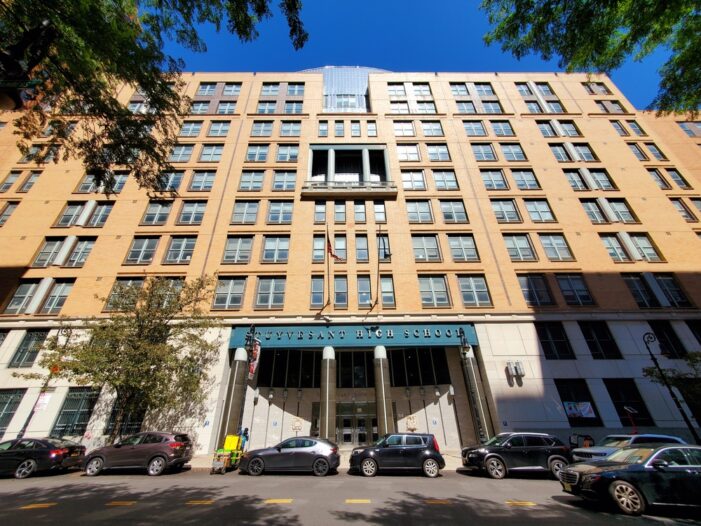Editorial credit: Dariusz Gryczka / Shutterstock.com
By
The new school year has barely begun, and already New York City’s notoriously complex (and often controversial) high school admissions process kicks off next week, lasting through early December.
The process can be daunting for the tens of thousands of eighth grade families applying to public high schools, and economic and racial diversity concerns remain at the city’s most selective schools.
Last year, nearly half of the city’s eighth grade applicants were admitted to their top choice school, while about 75% were admitted to one of their top three picks. About 95% of applicants were admitted to one of the 12 schools they ranked in their application, according to city data.
The months-long process can lead to heightened levels of anxiety and confusion for families. It often feels inequitable, with families who have the time and resources to devote to the process having an upper hand, parents say.
Details about tours and application requirements can vary from school to school, and information posted online can at times be slow to update. Meanwhile, the roughly two-month timeline and wide array of options, with more than 700 programs at over 400 schools, add further stress to the equation.
Joyce Szuflita, a Brooklyn-based admissions consultant who runs NYC School Help, called it “a scavenger hunt with too little time.”
For families who are going through the middle and high school application process simultaneously, it can feel even more overwhelming. “How can those families not blow a gasket?” she said.
When do applications open? What is the deadline for high school applications in NYC?
The city’s high school application process is expected to open on Oct. 3.
Registration opens the same day for the Specialized High Schools Admissions Test, or SHSAT — the sole metric by which eight of the city’s prestigious specialized high schools admit students.
The test will take place during the school day at public schools, with additional weekend test dates available for public school students, 9th grade testers, and charter/non-public school testers, according to Education Department officials.
Families will have until Oct. 27 to register for the SHSAT.
High school applications will remain open until Dec. 1, with offers set to release on March 7.
Meanwhile, middle school admissions are staggered by about a week, with applications opening Oct. 11 and closing Dec. 8. Middle school offers are expected to be released on April 3.
The city’s Education Department will hold several virtual admissions events in October. Many schools list their open houses and tours on the city’s MySchools directory. High school fairs are listed there as well.
How did NYC high schools admit students last year?
Schools across the city employ different methods of determining admissions, with various application requirements specific to each.
For admissions to the city’s selective screened schools, this fall’s incoming ninth graders were sorted into four different priority groups based on their seventh grade GPAs in core subjects. In cases where there were more applicants in a priority group than seats, selections were made based on a random number assigned to each applicant, often referred to as a lottery number.
Some schools also required admissions essays or auditions, which were further used to make determinations.
More than 40 selective schools also participate in a diversity initiative, setting aside a certain number of seats to students who are low-income, English language learners, or live in temporary housing. There was a separate lottery for these seats.
Other schools used open or educational option admissions, which primarily used an applicant’s random number for admissions, though some took into account additional criteria to create priority groups. (Educational option programs set aside seats for students at different academic levels to promote academic diversity.)
Will this year use the same application guidelines?
Screened schools will follow the same admissions process as last year, according to the city’s Education Department — though the grade averages for each priority group have shifted slightly.
Middle school admissions will also follow the same broad format as last year, officials said.
What do experts recommend to get started?
Sindy Nuesi, director of the Middle School Student Success Center at the Cypress Hills Local Development Corporation, recommends families start by narrowing down the vast field of possible schools.
Nuesi advises families and students to first decide how far they’re willing to commute to school, or whether there are specific neighborhoods in which they’d like to attend school. From there, they can look for programs that fit their child’s interests.
“Even though a lot of students are still not too sure what they want, if they do have some particular interest that they really like, it narrows down the options,” she said, adding families can filter searches based on interest areas. “That makes it less overwhelming.”
Nuesi also suggests developing a relationship with your school counselor, who can help at each step of the admissions process.
Elissa Stein, an admissions consultant who runs High School 411, urges parents to look at the process holistically and not become fixated on a particular school or program.
“I always tell families that they should be taking things into consideration based on their child,” she said. “So think things through in terms of the size of the school, the things that they offer, the academic ranges, the commute, the building, the neighborhood — there are so many things that will make a school a good fit for your child or not.”
Opening your mind to exploring schools you’re not as familiar with also aids in the process, she added.
“There are schools that everybody knows by name and reputation,” Stein said. “But there are a lot of other schools that aren’t as well known that could be wonderful fits.”
What are some tips to avoid getting overwhelmed?
Staying organized, keeping track of important dates, and taking notes can help ease the process, Stein suggested.
Pamela Wheaton, an admissions consultant who runs SchoolScoutNYC, suggested families cast a wide net in their applications and take advantage of resources like InsideSchools, which posts information about schools across the city.
Families should also find ways to tap their communities. Parents can team up with other families to coordinate school visits, allowing them to cover more ground in the condensed timeline, Wheaton said.
What does your high school lottery number mean for admissions?
Last year, for the first time, the Education Department sent all families their lottery numbers — a string of 32 numbers and letters — at the beginning of the application process. Many families on Facebook groups sent around tip sheets on how to interpret the number to figure out where students fell to gauge their odds.
Education Department officials said families will be able to see their random numbers when they start their high school applications in MySchools on or after Oct. 3.
Szuflita warns against worrying too much about the number.
“Everybody calls this the lottery,” she said. “It’s not a lottery. It’s a match.”
Though the random number can be consequential, at many schools it is just one of many factors, Szuflita said. At some schools that require applicants to write essays, for example, the number is less likely to play a major role. And at the city’s eight specialized high schools, the number isn’t considered at all, Szuflita added.
“Your random number in this process is a tiebreaker,” she said. “When there are candidates of equal priority, then the random number comes into play.”
Ultimately, admissions consultants and counselors say to take a deep breath and trust that your student will land somewhere they can be successful.
“Be fluid, be calm, because everything will come in good time,” Szuflita said. “It will all be fine. There are so many great schools. There are so many worthy programs.”
This story was published by THE CITY on September 29 2023.




